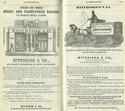 Greater wealth and population supported the building of new concert halls (City Hall, 1841, and St Andrew's Hall in 1877) and the growth of choral and orchestral unions able to perform the most ambitious works of the day such as Berlioz's Grand Messe des Morts in 1885.
Greater wealth and population supported the building of new concert halls (City Hall, 1841, and St Andrew's Hall in 1877) and the growth of choral and orchestral unions able to perform the most ambitious works of the day such as Berlioz's Grand Messe des Morts in 1885.
 The University had, until 1906, an organist and little else, but the Glasgow Athenaeum, predecessor of the Royal Scottish Academy of Music & Drama, was founded in 1847. Concentrating music tuition in a school of music in 1890, it attracted 1,700 students of all ages, set up an Opera Class in 1893, and put on senior and junior orchestral concerts. Professional opera first came to Glasgow in 1877 with the Carl Rosa company.
The University had, until 1906, an organist and little else, but the Glasgow Athenaeum, predecessor of the Royal Scottish Academy of Music & Drama, was founded in 1847. Concentrating music tuition in a school of music in 1890, it attracted 1,700 students of all ages, set up an Opera Class in 1893, and put on senior and junior orchestral concerts. Professional opera first came to Glasgow in 1877 with the Carl Rosa company.
 Classical musicians, such as the renowned Glaswegian pianist Frederic Lamond (1868-1948), could receive proper training and find outlets as performers and composers. The composer William Wallace (1860-1940) was able to hear his works performed in the city in which he was a medical student. In music publishing, Bayley & Ferguson and Mozart Allen took the lead. Music criticism was published on a considerable scale, writers such as James Webster including extended notices of music festivals elsewhere in Britain. Music hall flourished with figures such as Will Fyffe (1885-1947) and Harry Lauder (1870-1950) who wrapped his skills as singer and comedian in swathes of tartan.
Classical musicians, such as the renowned Glaswegian pianist Frederic Lamond (1868-1948), could receive proper training and find outlets as performers and composers. The composer William Wallace (1860-1940) was able to hear his works performed in the city in which he was a medical student. In music publishing, Bayley & Ferguson and Mozart Allen took the lead. Music criticism was published on a considerable scale, writers such as James Webster including extended notices of music festivals elsewhere in Britain. Music hall flourished with figures such as Will Fyffe (1885-1947) and Harry Lauder (1870-1950) who wrapped his skills as singer and comedian in swathes of tartan.
 The demand for music and musical instruments was met by manufacturers. Paterson's were dominant, but the Dulcitone (a 5-octave keyboard instrument with graduated steel tuning forks struck by hammers, designed for export to humid climates) was designed and patented by Machells.
The demand for music and musical instruments was met by manufacturers. Paterson's were dominant, but the Dulcitone (a 5-octave keyboard instrument with graduated steel tuning forks struck by hammers, designed for export to humid climates) was designed and patented by Machells.
 Choral societies burgeoned, drawing members from all classes and performing major classical works. Scots songs, accompanied by the ubiquitous piano, were sung alongside classical repertoire. People too poor to own the cheapest pianos made their own music and instruments including fiddles and hammered dulcimers. Some of the songs commemorating local events, such as the Blantyre mining disaster or The Soor Milk Cairt, are still well known today.
Choral societies burgeoned, drawing members from all classes and performing major classical works. Scots songs, accompanied by the ubiquitous piano, were sung alongside classical repertoire. People too poor to own the cheapest pianos made their own music and instruments including fiddles and hammered dulcimers. Some of the songs commemorating local events, such as the Blantyre mining disaster or The Soor Milk Cairt, are still well known today.